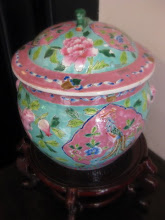
Peranakan and Baba-Nyonya (traditional Chinese: 峇峇娘惹; Hokkien: Bā-bā Niû-liá) are terms used for the descendants of late 18th century Chinese immigrants to the Nusantara region during the Colonial era. It applies especially to the ethnic Chinese populations of the British Straits Settlements of Malaya and the Dutch-controlled island of Java and other locations, who have adopted partially or in full Malay customs to be somewhat assimilated into the local communities.
Most Peranakan are of Hoklo (Hokkien) ancestry, although a sizable number are of Teochew or Cantonese descent. Originally, the Peranakan were part Chinese, part Malay. Baba Nyonya are a subgroup within Chinese communities, are the descendants of Sino-indigenous unions in Melaka and Penang. It was not uncommon for early Chinese traders to take Malay women of Peninsular Malay or Sumatera as wives or concubine. Consequently the Baba Nyonya possessed a synergistic mix of Sino-Malay cultural traits.
Written records from the 19th and early 20th centuries show that Peranakan men usually took brides from within the local Peranakan community. Peranakan families occasionally imported brides from China and sent their daughters to China to find husbands.
Some sources claim that the early Peranakan inter-married with the local Malay population; this might derive from the fact that some of the servants who settled in Bukit Cina who traveled to Malacca with the Admiral from Yunnan were Muslim Chinese. Other experts, however, see a general lack of physical resemblance, leading them to believe that the Peranakan Chinese ethnicity has hardly been diluted. Some Peranakan distinguish between Peranakan-Baba (those Peranakan with part Malay ancestry) from Peranakan (those without any Malay ancestry).
The language of the Peranakans, Baba Malay (Bahasa Melayu Baba), is a dialect of the Malay language (Bahasa Melayu), which contains many Hokkien words. It is a dying language, and its contemporary use is mainly limited to members of the older generation. English has now replaced this as the main language spoken amongst the younger generation.
Most Peranakan are of Hoklo (Hokkien) ancestry, although a sizable number are of Teochew or Cantonese descent. Originally, the Peranakan were part Chinese, part Malay. Baba Nyonya are a subgroup within Chinese communities, are the descendants of Sino-indigenous unions in Melaka and Penang. It was not uncommon for early Chinese traders to take Malay women of Peninsular Malay or Sumatera as wives or concubine. Consequently the Baba Nyonya possessed a synergistic mix of Sino-Malay cultural traits.
Written records from the 19th and early 20th centuries show that Peranakan men usually took brides from within the local Peranakan community. Peranakan families occasionally imported brides from China and sent their daughters to China to find husbands.
Some sources claim that the early Peranakan inter-married with the local Malay population; this might derive from the fact that some of the servants who settled in Bukit Cina who traveled to Malacca with the Admiral from Yunnan were Muslim Chinese. Other experts, however, see a general lack of physical resemblance, leading them to believe that the Peranakan Chinese ethnicity has hardly been diluted. Some Peranakan distinguish between Peranakan-Baba (those Peranakan with part Malay ancestry) from Peranakan (those without any Malay ancestry).
The language of the Peranakans, Baba Malay (Bahasa Melayu Baba), is a dialect of the Malay language (Bahasa Melayu), which contains many Hokkien words. It is a dying language, and its contemporary use is mainly limited to members of the older generation. English has now replaced this as the main language spoken amongst the younger generation.
http://en.wikipedia.org/wiki/Peranakan


This comment has been removed by the author.
ReplyDeleteMy Great- GrandMa is a Baba Nyonya but she married a Sri Lankan. She is also a Christian. What is her ancestry then?
ReplyDelete